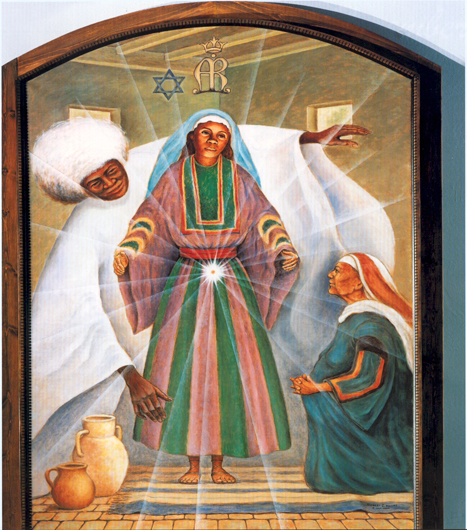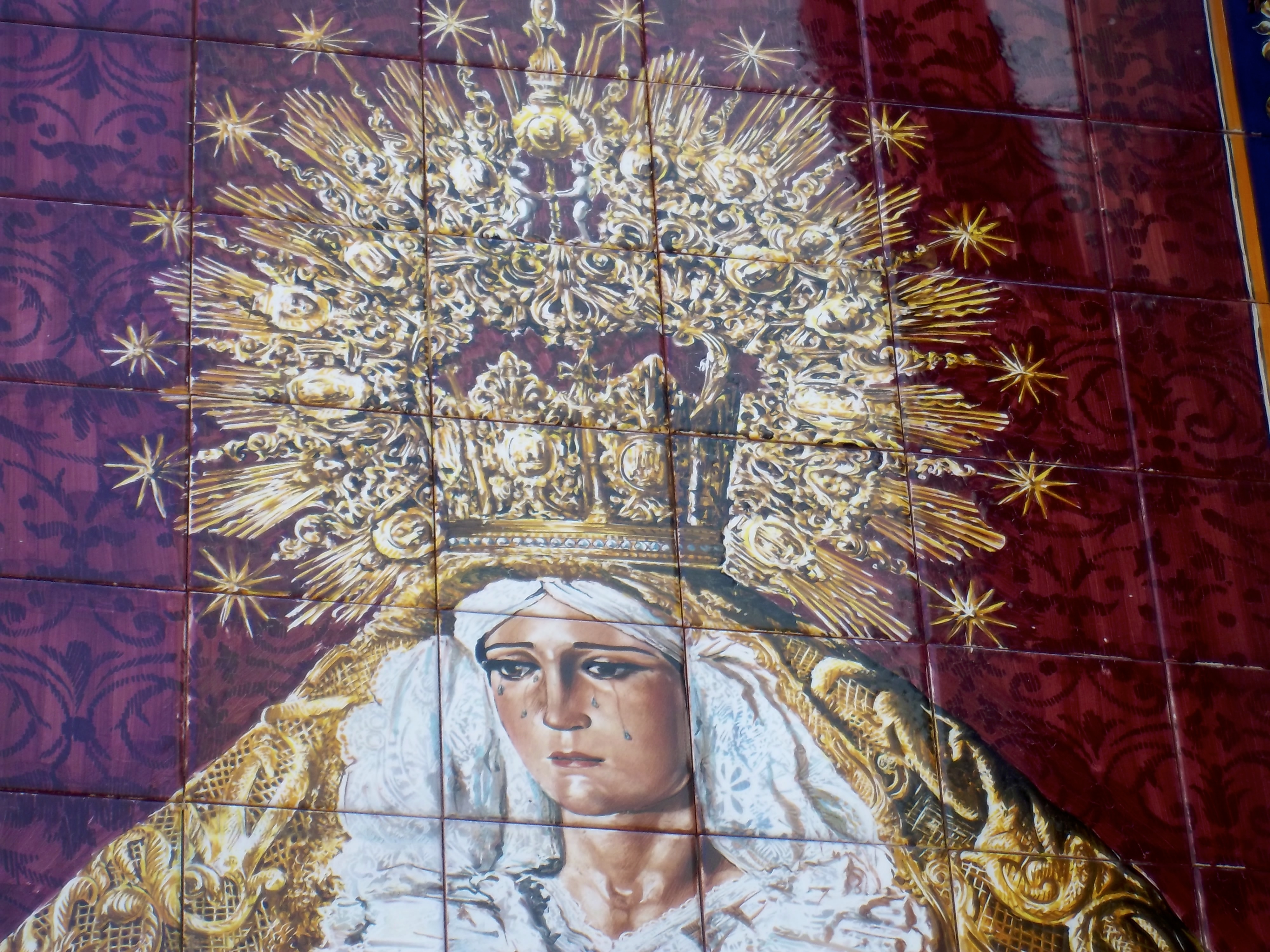God has shown strength with God’s arm;
God has scattered the proud in the thoughts of their hearts.
God has brought down the powerful from their thrones,
God has scattered the proud in the thoughts of their hearts.
God has brought down the powerful from their thrones,
and lifted up the lowly;
God has filled the hungry with good things,
God has filled the hungry with good things,
and sent the rich away empty.
God has helped God’s servant Israel,
God has helped God’s servant Israel,
in remembrance of God’s mercy,
according to the promise God made to our ancestors,
to the descendants of Abraham through Hagar and Sarah and Keturah forever.
Luke 1:46-56, RGT, (Revised Gafney Translation)

The Magnificat properly belongs at the Visitation, traditionally 31 May – an unspecified amount of time after the Annunciation, observed on 25 March (often in Lent, occasionally on Good Friday) – In those days Miryam, Mary, set out… Luke 1:39. It is “repeated” in Advent, though many missed it earlier.
“God has…“
The Virgin proclaims that God has already done all of these things, in spite of all evidence to the contrary, in spite of her present reality.
God has shown strength with God’s own arm at varying points throughout Israel’s history, and the memory, witness and testimony of their ancient scriptures and new psalms to God’s strength, willingness and power to save in those times is enough for the present moment. In the face of the mighty Roman Empire, what God has already done is enough.
God has scattered the proud in the thoughts of their hearts in the songs and stories of old enfolded into the scriptures of Israel. Herod’s arrogance goes yet unchallenged but God has unseated the proud from their thrones in their hearts and halls before and it is enough.
God has brought down the powerful from their thrones inside and outside of Israel, whether or not they were enthroned with God’s blessing. God has deposed other gods from within their own realms. Caesar or any other would-be god, it matters not. God has done it before and can do it again. And that is enough.
God has lifted up the lowly time and time again. In spite of the biases of Israel’s story-tellers and scripture-writers, the God of Israel visits and blesses women and children and slaves and foreigners. A peculiarly pregnant girl-child and her post-menopausal cousin with her own pregnancy predicament may be beyond the notice of Rome, but not God. And it is enough.
God has filled the hungry with good things in the before times and every once in a while in our time. People still go hungry, people still die in squalor, taxed to death by Rome and Romanesque imperial imitators, but God still provides unexpected and unimaginable blessings. Our people will not be starved to death and pass out of existence on God’s watch. Some of us will survive and that is enough.
God has sent the rich away empty in our stories and songs and scriptures. The glory of Rome is not eternal. Ask the Egyptians, ask the Assyrians, ask the Babylonians, ask the Persians, ask Alexander the Great, if you can find him. God has done it before and that is enough.
God has helped God’s servant, in our faithfulness and in our faithlessness. God has been faithful. In our history, in our memories, in our scriptures, God has been faithful and it is enough.
God has remembered God’s promise and will keep it. Our prophets Miriam and Moses taught us to hold God accountable to God’s promises. They bargained and argued with God and never let God forget God’s promises to our ancestors or to us, their descendants. Even when the promises have not yet been kept, God remembers and that is enough.
Dayenu. “It is enough.” This is a Pesach (Passover) theology. Sometimes the Visitation overlaps with Pesach. Dayenu, is the refrain and title of what may be the most familiar and popular Passover song. The song says that if God had only… and lists the miracles God performed for the ancestors, if God had only done one and not these that followed, it would have been enough. Dayenu.
And it occurs to me that the theology that the Ever-Blessed Virgin named for Miryam the Prophet of Exodus is proclaiming is Dayenu, Passover theology even though the song would be written centuries after her death or assumption, whichever you prefer.
The Holy Mother of the Word-Made-Flesh is herself a Torah-sage and she teaches us. Her perspective on the yoke of Roman oppression that strangled her world is framed by the memory of what God has done for her people and her ancestors. And by what God is doing to and through her: Kedushat haShem, sanctifying the Divine Name.
Kedushat haShem, sanctifying the Divine Name would come to be the way in which the actions of martyrs were understood. The Stations of the Cross liturgy on Good Friday places the words of No’omi and Lamentations on the lips of the Sorrowful Virgin at the foot of the cross: Call me not My-Pleasant-One, No’omi; call me Bitter-Woman, Mara. For Mother God, the nurturing nursing Shaddai has embittered me. And, Look and see if there is any sorrow like my sorrow. For me, the Mother of Sorrows is also the Mother of Martyrs. And there have been enough. Dayenu.

Truly all generations call you blessed.
My soul magnifies the Lord, and my spirit rejoices in God my Savior,
for God has looked with favor on the lowliness of God’s servant.
Surely, from now on all generations will call me blessed;
for the Mighty One has done great things for me,
and holy is God’s Name.
Post Script: The Magnificat is woven from Hannah’s Hymn in 1 Sam 2 which also lives on in Ps 113, making Hannah one of the most overlooked authors of scripture.

Belle
October 31, 2021 10:50 amAppropriation much? Wow.
Wil
October 31, 2021 1:15 pmNot in the least. A Jewish woman’s prayer corresponding to Jewish theology that would have been taking shape during her time is not appropriation.
Beth Rakestraw
November 22, 2021 6:23 pmHi there. My congregation would love to use the image from Robert Moore you used in this blog post for a bulletin cover. We want to give credit to the artist as well as practice ethical use. So far in my research, I can’t find a source. Do you have that information readily available? If so, would you please share?
Thank you. I am also your revgalblogpal “cousin”, BTW.
Beth Rakestraw
Wil
November 22, 2021 7:29 pmI think that as long as you clearly identify the artwork as being that of Mr. Moore and that it is located in the African Episcopal Church of St. Thomas in Philadelphia Pennsylvania, you will be fine.